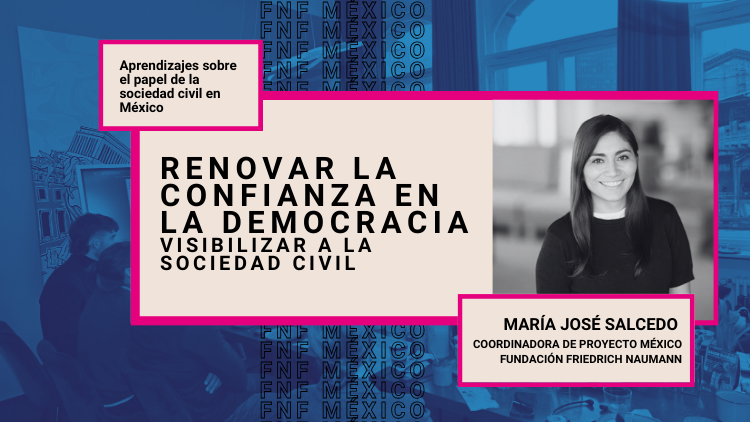FNF
Renewing Trust in Democracy: Making Civil Society more Visible

It is clear that the democratic model is being questioned in many countries. Many people consider it better for one party to have a majority so that decisions can be made more quickly. However, in a democracy it is natural to have slow decision-making processes because everything must be debated. Debate is inherent to democracy, it ensures that different perspectives are heard and thus the representation of the different groups that make up a society.
Democracy is composed by the balance of powers and respect for human rights. Nevertheless, little is said about civil society organizations as necessary supporters of democratic quality. Civil society refers to organized groups of people who are independent of the state, such as non-governmental organizations and think tanks that produce innovative policy ideas.
The word "civil" refers to our role as individuals and citizens in promoting a relevant agenda for our society. The incredible thing about civil society organizations is that there are as many as the multiple interests and problems that concern citizens. Therefore, civil society is a practical example of living in a plural, diverse, and tolerant society.
In Mexico, civil society is relatively "new" when compared to other countries with a long tradition of organizations, such as Germany. Additionally, in our country, most organizations have a welfare-oriented approach, voluntary in nature, and support social causes. Organizations with political influence and think tanks are also recent, as reflected in the list of the most important Think Tanks in the world, published in 2019 by the University of Pennsylvania, which did not include any Mexican organizations within the top 75. Excluding the United States, we can find Mexican organizations such as Ethos Lab, COMEXI, CIDAC, and Fundar in the list of the 150 most important Think Tanks in the world. These organizations conduct research with data to influence and improve public policies that concern our daily lives. Currently, the most important and influential think tanks are in the United States, Germany, the United Kingdom, and France.
While Mexico has 33 civil society organizations per 100,000 inhabitants, the United States has 680, Chile has 650, and Brazil has 170. Additionally, one out of every two organizations is concentrated in 6 states of the Republic: Chiapas, Mexico City, the State of Mexico, Jalisco, Oaxaca, and Veracruz. Until 2018, only 8% of funding came from public sources, compared to 31% in the United States. Moreover, 85% of the resources of organizations come from self-generated income. Perhaps this occurs in Mexico because the sector represents only 2% of the population, while in more consolidated democracies such as Germany or the United States, this figure rises to 11% and 10% respectively. In Germany, there are organizations such as VENRO (Association for Development Policy and Humanitarian Aid) or the Bundesverband Deutscher Stiftungen (National Association of German Foundations) that bring together all civil society organizations to represent their interests, organize exchange events, and networking to strengthen the sector. In Mexico, the Mexican Center for Philanthropy (CEMEFI) brings together organizations committed to social change, but without the depth of organizations in Germany.
It is a mistake to think that to influence state decisions, one must hold elected positions as if that was the only source of legitimacy to participate in public affairs. When civil society organizations collaborate with governments, they remain independent, as they do not seek political power. The task is to collaborate to strengthen institutional frameworks and generate appropriate public policies. Advocacy should be understood as achieving the representation of the interests of the people that make up a society, ensuring that their rights are recognized in laws and policies are implemented to guarantee them in practice.
Civil society is an element that limits and controls the power of the state. Through their research and analysis, think tanks generate knowledge so that journalists, academics, and the public can make informed decisions and learn about abuses of power. Therefore, the deterioration of the spaces of action of organizations in Mexico, as well as the cuts to the little funding they receive, is worrying. If we seek greater international relevance and national influence, and not just a welfare-oriented approach from our organizations, they must be talent centers with the most educated people in the country, who deserve remuneration commensurate with their university education and work experience. Thus, the reduction in budget that affects the quality of life of researchers, analysts, and experts, damaging the third sector as a whole and its great potential, becomes a grievance.
More and more people are doubting the democratic model. It seems that confidence in the system is lost. Politicians come and go, corruption scandals seem never-ending, and inequality is unfortunately persistent. How could we restore confidence in democracy? Perhaps we should look to the sector of civil society organizations, so often invisible and forgotten, but which unlike many political leaders, have remained over time, guaranteeing our rights and improving the country's competitiveness by advancing initiatives and proposals for public policies. Supporting their work and seeking to increase their visibility and representation should be our priority if we want to live in a democracy and see the sector grow to produce the best expert analysts.
